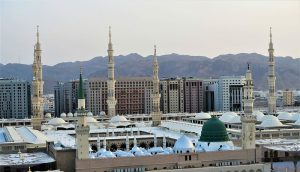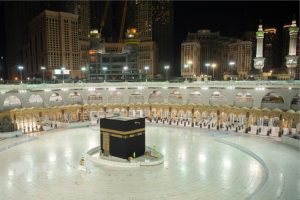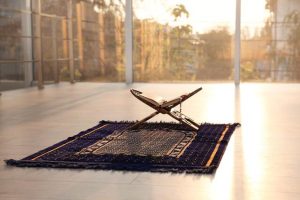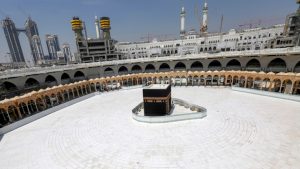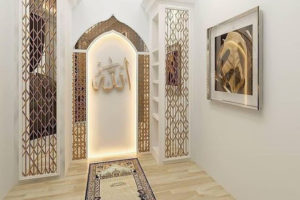عَنْ أَبِي سَعِيدٍ الخدري عن رَسُولَ الله صَلَّى الله عَلَيه وسَلَّم قَالَ : أيما رَجُلٍ لَمْ يَكُنْ عِندَهُ صَدَقَةٌ ، فَليَقُل في دُعَائِه: اَللّهُمَّ صَلِّ عَلَى مُحَمَّدٍ عَبْدِكَ وَرَسُولِكَ ، وَصَلِّ عَلَى الْمُؤْمِنِينَ وَالْمُؤْمِنَاتِ ، وَالْمُسْلِمِينَ وَالْمُسْلِمِاتِ ، فَإِنَّهَا زَكَاةٌ (صحيح ابن حبان) Hadhrat Abu Saeed Khudri (Radhiallahu Anhu) reports …
Read More »Recent Posts
January, 2013
-
30 January
A Unique Feature of Baytul Muqaddas
The lands of Shaam, Palestine and surrounding areas are lands of blessings. The Mi`raaj of Nabi (Sallallahu Alaihi Wasallam) commenced from here. Allah Ta`ala Himself speaks of the blessings of this land in the Qur’aan: “We have blessed the lands around it.” Hadhrat Ebrahim (Alaihis Salaam) had moved from Iraq …
Read More » -
29 January
Earn the Duaa of Seventy Thousand Angels
عَن عَلِي رَضِيَ اللهُ عَنهُ سَمِعتُ رَسُولَ اللهِ صَلىَّ اللهُ عَلَيهِ وَ سَلَّمَ يَقُولُ مَا مِن مُسْلِمٍ يَعُودُ مُسْلِمًا غَدْوَةً إلاَّ صَلَّى عَلَيهِ سَبْعُونَ أَلْفَ مَلَكٍ حَتَّى يُمْسِىَ وَإِنْ عَادَهُ عَشِيَّةً إِلَّا صَلَّى عَلَيهِ سَبْعُونَ أَلْفَ مَلَكٍ حَتَى يُصْبِحَ وَكَانَ لَهُ خَرِيفٌ فِي الْجَنَّةِ (الترمذي 1/116) Hadhrat Ali (Radhiallahu Anhu) …
Read More » -
26 January
Hadhrat Abu Bakr Siddeeq (Radhiallahu Anhu)’s sacrifice for Rasulullah (Sallallahu Alaihi Wasallam)
عن أبي هريرة رضي الله عنه قال : قال رسول الله صلى الله عليه و سلم ( ما نفعني مال قط ما نفعني مال أبو بكر ) قال فبكى أبو بكر وقال يا رسول الله هل أنا ومالي إلا لك يا رسول الله (ابن ماجة ص10) Hadhrat Abu Hurayrah (Radhiallahu Anhu) reports that Rasulullah …
Read More » -
25 January
Virtues of Jumu’ah
The day of Jumu’ah holds great importance and significance in Islam. It is among the great favours of Allah Ta‘ala upon this Ummah and it is a salient feature of Islam.
Hazrat Rasulullah (sallallahu ‘alaihi wasallam) said:
“The day of Jumu’ah is sayyidul ayyaam (i.e. the leader of all days), and the greatest day (from the days of the week) in the sight of Allah Ta‘ala. It is more virtuous than the day of Eidul Adha and the day of Eidul Fitr in the sight of Allah Ta‘ala.
Read More »
-
Hazrat Abdullah bin Mas’ood (radhiyallahu ‘anhu) killing Abu Jahl
After the Battle of Badr was fought and Rasulullah (sallallahu alihi wasalllam) and the Sahaabah …
Read More » -
An Interesting Dialogue Regarding the Belief of the Qur’aan Majeed – The Orchards of Love – Part 94
-
The Islam of Hazrat Abdullah bin Mas’ood (radhiyallahu ‘anhu)
-
Rasulullah (sallallahu ‘alaihi wasallam) Praising the Recitation of Hazrat Abdullah bin Mas’ood (radhiyallahu ‘anhu)
-
The Compassion of Allah Ta‘ala – The Orchards of Love – Part 93
-
Receiving Seventy Rewards
Hazrat Abdullah bin Amr bin Aas (radhiyallahu ‘anhuma) reported, “Whoever sends salutations upon Nabi (sallallahu ‘alaihi wasallam) once,...
Read More » -
Increase in Sustenance
-
The Reward of Fasting on the Day of Arafah
-
The Angel that Stands at the Blessed Grave of Hazrat Rasulullah (sallallahu ‘alaihi wasallam) to Convey the Durood of the Ummah
-
Reciting Durood when Entering the Musjid
-
Sunnats and Aadaab when dealing with neighbours – 1
Islam has afforded special rights to neighbours and commanded Muslims to uphold these rights. In …
Read More » -
Sunnats and Aadaab of the Guest – 5
-
Sunnats and Aadaab of the Guest – 4
-
Sunnats and Aadaab of the Guest – 3
-
Sunnats and Aadaab of the Guest – 2
-
Hazrat Umar bin Khattaab (radhiyallahu ‘anhu)
Hazrat Umar (radhiyallahu ‘anhu) is the second khalifah of Islam and the greatest person of …
Read More » -
Hazrat Ali (radhiyallahu ‘anhu) – Part Forty-One – Being Sent by Rasulullah (sallallahu ‘alaihi wasallam) to Level the Graves, Destroy Idols and Erase Pictures
-
Rasulullah (sallallahu ‘alaihi wasallam) Approving of the Verdict of Hazrat Ali (radhiyallahu ‘anhu) – Part Forty
-
The True Ulamaa – Hazrat Ali (radhiyallahu ‘anhu) – Part Thirty Nine
-
Du‘aa for Assistance in Settling Debts – Hazrat Ali (radhiyallahu ‘anhu) – Part Thirty Eight
 Ihyaaud Deen An Effort to Revive Deen in Totality
Ihyaaud Deen An Effort to Revive Deen in Totality























